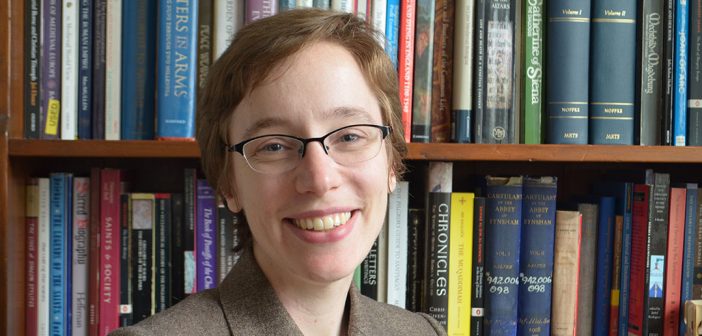Lucy Barnhouse is a woman living in two eras.
When she lies down to sleep at night, she’s in the 21st century. But during the day, Barnhouse is firmly ensconced in centuries long past.
Barnhouse, who is earning a doctorate in history on May 20 from the Graduate School of Arts and Sciences, has long been interested in questions about how law, the practice of the religious life, and social expectations of men and women intersect in the Middle Ages.
“I’ve been fascinated by stories about the Middle Ages since I was young enough to be falling out of trees while pretending to be Robin Hood,” she said.
She’s also been interested in medieval health. In her dissertation, “The Elusive Medieval Hospital: Mainz and the Middle Rhine Region,” Barnhouse researched four independent hospitals in Mainz, Germany: a 12th-century foundation, another hospital established by women forced to leave that foundation, a leper hospital, and a private foundation that functioned in the 1350s. She explored the seldom-examined comparisons between leper hospitals and other hospitals.
She said that leper hospitals have often been treated in scholarship as a separate category, distinct from multipurpose hospitals. Such a division is more a modern construction than actual history, however, as all kinds of medieval hospitals were legally defined as religious institutions. Therefore, she argues that “the regulation of medieval leper hospitals was not driven primarily by any fear of the disease.”
“The history of medieval hospitals remains quite fragmented even as it grows,” said Barnhouse, who visited Mainz on a Fulbright Fellowship from 2013 to 2014.
“I’m attempting to provide a basis for further synthesis that will enable us to incorporate medieval hospitals into our larger hospital history, to get a longer view of health care, and to avoid isolating the Middle Ages and making careless assumptions.”
Although it was the era’s vividness that piqued her initial interest in the medieval, what keeps Barnhouse coming back for more, she said, are the questions that don’t have obvious answers.
This coming fall, Barnhouse’s love of all things medieval will continue, as she’ll be teaching medieval history and literature as a visiting assistant professor at the College of Worcester.
She is also a founding member, along with Elizabeth Keohane-Burbridge, of the podcast series Footnoting History. Since the series’ launch in February 2013, she has contributed 18 episodes on women’s history, medical history, opera, and British popular fiction of the early 20th century. It’s both an outlet for Barnhouse to talk about interests not directly connected to her research, and a model for establishing communication between academics and the public.
“At Footnoting History, not only do we tell cool stories of historical research, but we explain how we found them.”



